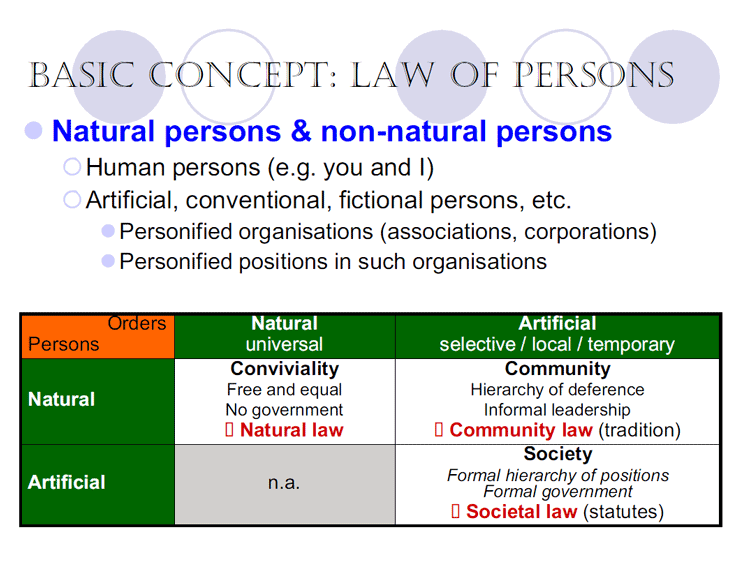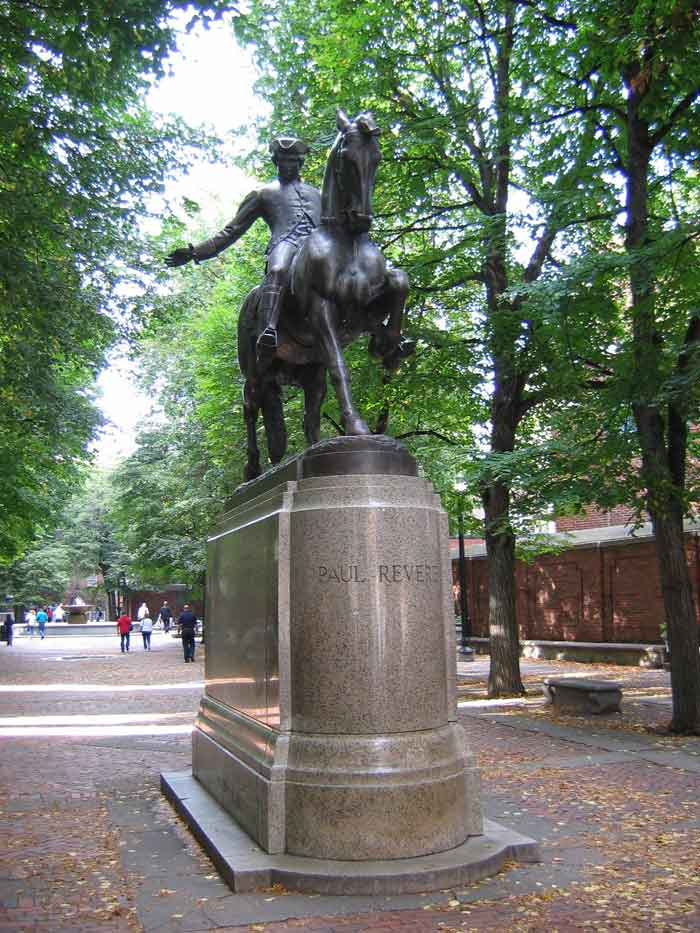 |
| Natural-Law-Frank-Van-Dun |
I. Natural Law vs. Natural Rights
A. "Natural rights are enshrined in the text of the Constitution Source: Randy E. Barnett Boston University School of Law 1. In the Ninth Amendment of The United States Constitution
2. In the Fourteenth Amendment of The United States Constitution
3. Let me begin by stressing what natural law & natural rights
|
B. Natural Law Definition
| "Jus Naturale, the natural law, or law of nature; law, or legal principles, supposed to be discoverable, by the light of nature or abstract resounding, or to be taught by nature to all nations and men alike, or law supposed to govern men and peoples in a state of nature, i.e. in advanced of organized governments or enacted laws (Black's Law Dictionary, 3rd ed., p. 1044) |
C. Natural Law and Natural Rights ( https://jim.com/rights.html)
"Jim.com" has created a superb must read site of 19 pages to understand more clearly what as happened to our freedoms and liberties. It is worth printing out to read thoroughly. Selected key quotes below. |
1. Natural law and natural rights follow from the nature of man and the world. True law derives from this right, not from the arbitrary power of the omnipotent state. |
2. The socialists attempted to remold human nature. Their failure is
further evidence that the nature of man is universal and unchanging.
Man is a rational animal, a social animal, a property owning animal
and a maker of things. He is social in the way that wolves and
penguins are social, not social in the way that bees are social. The kind
of society that is right for bees, a totalitarian society, is not right for people. ...humans are social, but not eusocial |
3. Natural law follows from the nature of men. We have the right to life, liberty and property, the right to defend ourselves against those who would rob, enslave, or kill us, because of the kind of animal that we are. |
4. Law derives from our right to defend ourselves and our property, not from the power of the state. If law was merely whatever the state decreed, then the concepts of the rule of law and of legitimacy could not have the meaning that they plainly do have, the idea of actions being lawful and unlawful would not have the emotional significance that it does have. As Alkibiades argued, (Xenophon) if the Athenian assembly could decree whatever law it chose, then such laws were not law, but merely force. The Athenian assembly promptly proceeded to prove him right by issuing decrees that were clearly unlawful, and with the passage of time its decrees become more and more lawless. |
5. The Greeks could see that we could recognize actions as inherently lawful or unlawful, without the need of the state to tell us. They had lived through some excellent examples of lawless states. But how is it that we know? They came out with an astonishingly modern answer, a line of reasoning that we would now call sociobilogical. |
6. This theory was demonstrated rather successfully in the "Wild West", which history shows was not nearly as wild as many modern cities with strict gun control. Beyond the reach of state power, property rights existed, businesses functioned. (Kopelo, 323-373) |
7. In those days (Dark ages) the church persistently and rightly claimed that natural law was above customary law, and that customary law was above tribal law and the law of the kings (fiat law). Natural law was taught in the great Universities of Oxford, Salamanca, Prague, and Krakow, and in may other places. |
8. In England the theory of natural law led to the Magna Charta, the Glorious Revolution, the declaration of right, and the English Enlightenment. It was the basis for the US revolution and the US Bill of Rights. |
9. Locke repeatedly, in ringing words, reminded us that a ruler is legitimate so far as he upholds the law. A ruler that violates natural law is illegitimate. He has no right to be obeyed, his commands are mere force and coercion. Rulers who act lawlessly, whose laws are unlawful, are mere criminals, and should be dealt with in accordance with natural law, as applied in a state of nature,..(continued here must read https://jim.com/rights.html) |
10. John Locke's writings were a call to arms, an assertion of the right and duty to forcibly and violently remove illegitimate rulers and their servants. |
11. This provided the moral an legal basis for many great revolutions and many governments. After the American revolution the North Americans were governed more or less in accordance with natural law for one hundred and thirty years, (i.e. 1776 to 1906). |
12. John Locke was writing for an audience that mostly understood what natural law was, even those who disputed the existence and force of natural law knew what he was talking about, and they made valid and relevant criticisms. In the nineteenth century people started to forget what natural law was, and today he is often criticized on grounds are irrelevant, foolish, and absurd. |
13. Throughout most of our evolution, men have been in a state of nature, that is to say without government, hierarchical organized religion, or an orderly and widely accepted means of resolving disputes. |
14. Not all things that are evil, or contrary to nature, are violations of natural law. Violations of natural law are those evils that may rightly be opposed by force, by individual unorganized violence. |
15. During the seventeenth and eighteenth centuries natural law was accepted in men's heads and in courts of law, as it always has been accepted in men's hearts. The advocates of absolutism were defeated, first intellectually, then politically, and then by force of arms, Kings who claimed to rule by divine right were killed or forced to flee." |
16. The Glorious Revolution of 1688 guaranteed an Englishman's right to bear arms (a right now lost), and more importantly, prohibited the state from using what we would now call a police force. The people were armed, state was unarmed. Individuals, not the state or the mob, applied lawful force when needed. This worked well, disproving the doctrine of monopoly of force, which derives from the absolutists, notably Hobbes. |
17. In practice free societies only arose where there was no monopoly of force, the most notable and important examples being seventeenth century England and eighteenth century North America. England, in the late seventeenth and early eighteenth centuries, exemplified the medieval ideal of liberty under law, and Kingly rule under law. |
18. In the English speaking world, government started to display disregard for natural rights about fifty years after they introduced a police force, about the time that people took power who had grown up in a state where police enforced the law. |
19. It is also no coincidence that respect for property rights in Switzerland is amongst the highest in the world, possibly the highest in the world. Switzerland also has lower tax levels than any other industrialized country. |
20. When the state attempts to impose an unnatural form of society, it requires a large amount of coercive violence to impose this form and the state undermines its own cohesion in the process. |
21.At the time that Locke wrote, natural law was about to become customary law, because the state was disarmed and the people armed....come law of Locke's time was already consistent with natural law but... |
22. Much common law came from Roman law and the law of the late Roman empire was often quite contrary to natural law. Freedom of association is a right under natural law, a crime under Roman law. |
23. Until the twentieth century Locke's position was widely accepted as self evident. When the state was unarmed and the people armed as in eighteenth century England and America, it was indeed self evident. During the nineteenth century the utilitarian's and the absolutists argued that the state derived its power from its capacity for large scale force, and that in order to impose the greater good on reluctant groups and individuals, the state should have a total and absolute monopoly of all force." |
24. "In many fields of academia, straying in the direction of consideration of natural law is apt to make your grants dry up, perhaps natural law theory tends to illegitimize most grant giving authorities. |
D. Additional Sources of Natural Law & Natural Rights
1. "Natural Law - The Science of Justice" - https://www.lysanderspooner.org/bib_new.html |
2. How I Learned about the root of law..but not in law school" - https://www.renewamerica.us/analyses/051222voigt.htm |
3. "Locke vs. Hobbs, A Comparison of Man as a Social Animal" - https://jim.com/hobbes.htm |
4. "An Introduction to Natural Law" - https://www.mises.org/story/2426 |
5. Further, natural law does not proclaim that democracy as a form of government is the sole admissible mode of political organization; yet it does tell us that any form of government, even one that is decked out in the trappings of democracy, which does not recognize the fundamental rights of the person and of the family is tyrannical and may, therefore, rightly be resisted" - The Natural Law: A study in Legal and Social History and Philosophy Heinrich Rommen 1936 - https://oll.libertyfund.org/ |
6. "The Imperative of Natural Rights in Today's World" - Randy E. Barnett, The Boston University School of Law Working Paper Series - https://papers.ssrn.com/sol3/papers.cfm?abstract_id=437400 |
7. A Natural Rights Perspective on Eminent Domain in California Pacific Legal Foundation - https://papers.ssrn.com/sol3/papers.cfm?abstract_id=649864 |
8. Organic Legal Documents - This is a great work showing the chronology leading up to the U.S. Constitution.
LONANG = Laws of Nature And Natures God is a brilliant expose. https://lonang.com/library/organic/ |
9. "A free people [claim] their rights as derived from the laws of nature, and not as the gift of their chief magistrate." Thomas Jefferson: Rights of British America, 1774. ME 1:209, Papers 1:134 |
10. "Natural rights [are] the objects for the protection of which society is formed and municipal laws established." Thomas Jefferson to James Monroe, 1797. ME 9:422 |
E. Applicable Material to Free Yourself From Adhesive Tyranny
| Rights Come From God & Cannot Be Taxed, Priviliges Come From Man & May Be |
F. Other Incoming and Outgoing Material on Natural Law and Natural Rights
Thought for the Day 10/12/2010 But Divinity cannot be cognized by
these two means. The sages Sathya Sai Baba |

